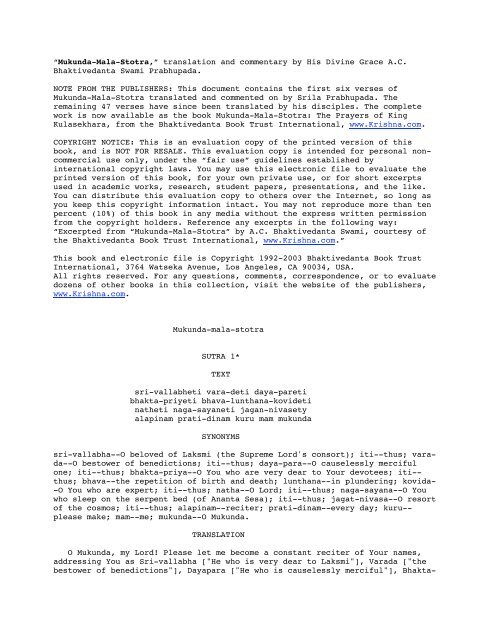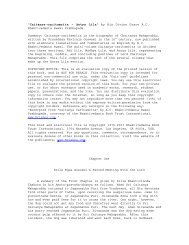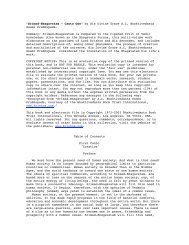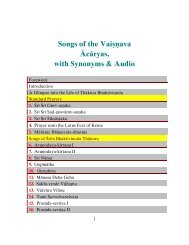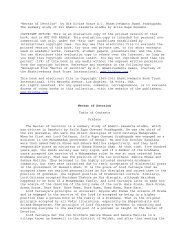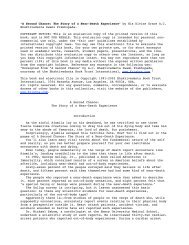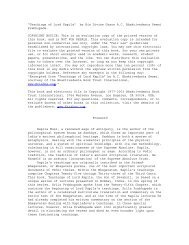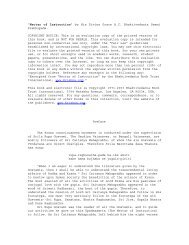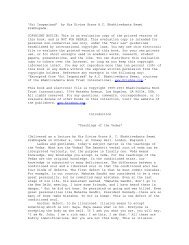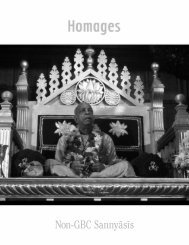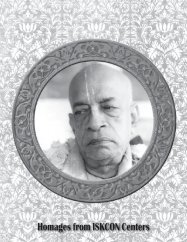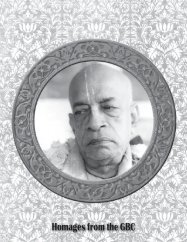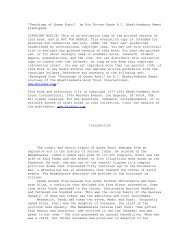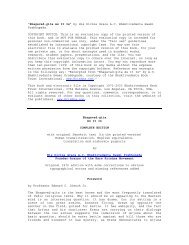“Mukunda-Mala-Stotra,” translation and commentary ... - Krishna.com
“Mukunda-Mala-Stotra,” translation and commentary ... - Krishna.com
“Mukunda-Mala-Stotra,” translation and commentary ... - Krishna.com
You also want an ePaper? Increase the reach of your titles
YUMPU automatically turns print PDFs into web optimized ePapers that Google loves.
<strong>“Mukunda</strong>-<strong>Mala</strong>-<strong>Stotra</strong>,<strong>”</strong> <strong>translation</strong> <strong>and</strong> <strong><strong>com</strong>mentary</strong> by His Divine Grace A.C.<br />
Bhaktivedanta Swami Prabhupada.<br />
NOTE FROM THE PUBLISHERS: This document contains the first six verses of<br />
Mukunda-<strong>Mala</strong>-<strong>Stotra</strong> translated <strong>and</strong> <strong>com</strong>mented on by Srila Prabhupada. The<br />
remaining 47 verses have since been translated by his disciples. The <strong>com</strong>plete<br />
work is now available as the book Mukunda-<strong>Mala</strong>-<strong>Stotra</strong>: The Prayers of King<br />
Kulasekhara, from the Bhaktivedanta Book Trust International, www.<strong>Krishna</strong>.<strong>com</strong>.<br />
COPYRIGHT NOTICE: This is an evaluation copy of the printed version of this<br />
book, <strong>and</strong> is NOT FOR RESALE. This evaluation copy is intended for personal non<strong>com</strong>mercial<br />
use only, under the “fair use<strong>”</strong> guidelines established by<br />
international copyright laws. You may use this electronic file to evaluate the<br />
printed version of this book, for your own private use, or for short excerpts<br />
used in academic works, research, student papers, presentations, <strong>and</strong> the like.<br />
You can distribute this evaluation copy to others over the Internet, so long as<br />
you keep this copyright information intact. You may not reproduce more than ten<br />
percent (10%) of this book in any media without the express written permission<br />
from the copyright holders. Reference any excerpts in the following way:<br />
“Excerpted from <strong>“Mukunda</strong>-<strong>Mala</strong>-<strong>Stotra</strong><strong>”</strong> by A.C. Bhaktivedanta Swami, courtesy of<br />
the Bhaktivedanta Book Trust International, www.<strong>Krishna</strong>.<strong>com</strong>.<strong>”</strong><br />
This book <strong>and</strong> electronic file is Copyright 1992-2003 Bhaktivedanta Book Trust<br />
International, 3764 Watseka Avenue, Los Angeles, CA 90034, USA.<br />
All rights reserved. For any questions, <strong>com</strong>ments, correspondence, or to evaluate<br />
dozens of other books in this collection, visit the website of the publishers,<br />
www.<strong>Krishna</strong>.<strong>com</strong>.<br />
Mukunda-mala-stotra<br />
SUTRA 1*<br />
TEXT<br />
sri-vallabheti vara-deti daya-pareti<br />
bhakta-priyeti bhava-lunthana-kovideti<br />
natheti naga-sayaneti jagan-nivasety<br />
alapinam prati-dinam kuru mam mukunda<br />
SYNONYMS<br />
sri-vallabha--O beloved of Laksmi (the Supreme Lord's consort); iti--thus; varada--O<br />
bestower of benedictions; iti--thus; daya-para--O causelessly merciful<br />
one; iti--thus; bhakta-priya--O You who are very dear to Your devotees; iti-thus;<br />
bhava--the repetition of birth <strong>and</strong> death; lunthana--in plundering; kovida-<br />
-O You who are expert; iti--thus; natha--O Lord; iti--thus; naga-sayana--O You<br />
who sleep on the serpent bed (of Ananta Sesa); iti--thus; jagat-nivasa--O resort<br />
of the cosmos; iti--thus; alapinam--reciter; prati-dinam--every day; kuru-please<br />
make; mam--me; mukunda--O Mukunda.<br />
TRANSLATION<br />
O Mukunda, my Lord! Please let me be<strong>com</strong>e a constant reciter of Your names,<br />
addressing You as Sri-vallabha ["He who is very dear to Laksmi"], Varada ["the<br />
bestower of benedictions"], Dayapara ["He who is causelessly merciful"], Bhakta-
priya ["He who is very dear to His devotees"], Bhava-lunthana-kovida ["He who is<br />
expert at plundering the status quo of repeated birth <strong>and</strong> death"], Natha ["the<br />
Supreme Lord"], Jagan-nivasa ["the resort of the cosmos"], <strong>and</strong> Naga-sayana ["the<br />
Lord who lies down on the serpent bed"].<br />
PURPORT<br />
A devotee of Godhead is he who glorifies the Personality of Godhead under the<br />
dictation of transcendental ecstasy. This ecstasy is a by-product of profound<br />
love for the Supreme, which is itself attained by the process of glorification.<br />
In this age of quarrel <strong>and</strong> fighting, the process of chanting <strong>and</strong> glorification<br />
re<strong>com</strong>mended here by King Kulasekhara is the only way to attain perfection.<br />
Persons who are infected with the disease of material attachment <strong>and</strong> who<br />
suffer from the pangs of repeated birth <strong>and</strong> death cannot relish such recitation<br />
of the Lord's glories, just as a person suffering from jaundice cannot relish<br />
the taste of sugar c<strong>and</strong>y. By nature sugar c<strong>and</strong>y is as sweet as anything, but to<br />
a patient suffering from jaundice it tastes as bitter as anything. Still, sugar<br />
c<strong>and</strong>y is the best medicine for jaundice. By regular treatment with doses of<br />
sugar c<strong>and</strong>y, one can gradually get relief from the infection of jaundice, <strong>and</strong><br />
when the patient is perfectly cured, the same sugar c<strong>and</strong>y that tasted bitter to<br />
him regains its natural sweetness.<br />
In the same way, glorification of the transcendental name, fame, attributes,<br />
pastimes, <strong>and</strong> entourage of the Personality of Godhead tastes bitter to those who<br />
are suffering from the infection of material consciousness, but it is very sweet<br />
to those who have recovered from this infection.<br />
All mundane philosophers, religionists, <strong>and</strong> people in general, who are<br />
constantly suffering from the threefold miseries of material existence, can get<br />
freedom from all such troubles simply by chanting <strong>and</strong> glorifying the holy name,<br />
fame, <strong>and</strong> pastimes of the Supreme Lord. The Supreme Lord, the Absolute Truth, is<br />
all spirit, <strong>and</strong> therefore His name, fame, <strong>and</strong> pastimes are nondifferent from<br />
Him. All of them are identical. In other words, the holy name of the Lord is the<br />
Lord Himself, <strong>and</strong> this can be understood by realization. By chanting the holy<br />
names of the Lord, which are innumerable, one can actually associate with the<br />
Lord personally, <strong>and</strong> by such constant personal touch with the all-spiritual<br />
Lord, one will be<strong>com</strong>e spiritually self-realized. This process of selfrealization<br />
is very suitable for the fallen souls of this age, when life is<br />
short <strong>and</strong> when people are slow in underst<strong>and</strong>ing the importance of spiritual<br />
realization, prone to be misled by false association <strong>and</strong> false spiritual<br />
masters, unfortunate in every respect, <strong>and</strong> continuously disturbed by innumerable<br />
material problems.<br />
King Kulasekhara, an ideal pure devotee of the Lord, shows us by his own<br />
realization how to offer prayers to the Lord. Since he is a maha-jana, an<br />
authority in the line of devotional service, it is our prime duty to follow in<br />
his footsteps in order to achieve the highest devotional platform.<br />
He first addresses the Lord as Sri-vallabha, "He who is very dear to Laksmi."<br />
The Lord is the Supreme Personality of Godhead, <strong>and</strong> His consort, Laksmi, is a<br />
manifestation of His internal potency. By exp<strong>and</strong>ing His internal potency, the<br />
Lord enjoys His spiritual paraphernalia. In the highest spiritual realization,<br />
therefore, the Lord is not impersonal or void, as empiric philosophers conceive<br />
Him to be. Although He is not of the material world, He is much more than simply<br />
a negation of material variegatedness. He is positively the supreme enjoyer of<br />
spiritual variegatedness, of which Laksmi, the internal potency, is the<br />
fountainhead.<br />
King Kulasekhara next addresses the Lord as Varada, "the bestower of<br />
benedictions," because it is He alone who can deliver to us the actual<br />
substance--spiritual bliss. When we detach ourselves from His association, we<br />
are always in the midst of want <strong>and</strong> scarcity, but as soon as we get in touch<br />
with Him, our gradual endowment with all bliss begins. The first installment of
this bliss is the clearance of the layer of dust that has accumulated in our<br />
hearts due to millions of years of material association. As soon as the dust of<br />
materialism is brushed aside, the clear mirror of the heart reflects the<br />
presence of the Lord. And as soon as we see Him we are automatically freed from<br />
all kinds of aspirations <strong>and</strong> frustrations. In that liberated state, everything<br />
is blissful in relation with the Lord, <strong>and</strong> one has no desires to fulfill <strong>and</strong><br />
nothing to lament over. Thus, following the benediction, full spiritual bliss<br />
<strong>com</strong>es upon us, ushering in full knowledge, full life, <strong>and</strong> full satisfaction with<br />
our whole existence.<br />
King Kulasekhara next addresses the Lord as Dayapara, "He who is causelessly<br />
merciful," because there is no one but the Lord who can be a causelessly<br />
merciful friend to us. He is therefore also called Dina-b<strong>and</strong>hu, "the friend of<br />
the needy." Unfortunately, at times of need we seek our friends in the mundane<br />
world, not knowing that one needy man cannot help another. No mundane man is<br />
full in every respect; even a man possessing the greatest riches is himself<br />
needy if he is devoid of a relationship with the Lord. Everything is zero<br />
without the Lord, who is the digit that transforms zero into ten, two zeros into<br />
one hundred, three zeros into one thous<strong>and</strong>, <strong>and</strong> so on. Thus a "zero man" cannot<br />
be<strong>com</strong>e happy without the association of the Lord, the supreme "1."<br />
The supreme "1" always wants to make our zero efforts valuable by His<br />
association, just as a loving father always wants an unhappy son to be in a<br />
prosperous position. A rebellious son, however, stubbornly refuses the<br />
cooperation of the loving father <strong>and</strong> thus suffers all sorts of miseries. The<br />
Lord, therefore, sends His bona fide representatives to all parts of the<br />
material creation, <strong>and</strong> sometimes He even <strong>com</strong>es Himself to reclaim His fallen<br />
sons. For this purpose He also exhibits the actual life in the transcendental<br />
world, which is characterized by relationships with Him in servitorship,<br />
friendship, parenthood, <strong>and</strong> consorthood. All relationships in the material world<br />
are but perverted reflections of these original relationships. In the mundane<br />
world we experience only the shadow of the reality, which exists in the<br />
spiritual world.<br />
The all-merciful Lord is always mindful of our difficulties in the mundane<br />
world, <strong>and</strong> He is more eager to get us to return home, back to Godhead, than we<br />
are eager to go. He is by nature merciful toward us, despite our rebellious<br />
attitude. Even in our rebellious condition we get all our necessities from Him,<br />
such as food, air, light, water, warmth, <strong>and</strong> coolness. Yet because we have<br />
detached ourselves from Him, we simply mismanage this paternal property. The<br />
leaders of society, despite all their materialistic plans, are misleaders, for<br />
they have no plan to revive our lost relationship with the Lord. His bona fide<br />
devotees, however, try their utmost to broadcast the message of our<br />
transcendental relationship with Him. In this way the devotees work to remind<br />
the fallen souls of their actual position <strong>and</strong> to bring them back home, back to<br />
Godhead. Such stainless servants of Godhead are very dear to Him. They receive<br />
such special favor from the Lord for their <strong>com</strong>passionate work that they can even<br />
go back to Godhead in this very lifetime <strong>and</strong> not be forced to take another<br />
birth.<br />
The Lord is therefore next addressed as Bhakta-priya, meaning "He who is very<br />
dear to His devotees" or "He who is very affectionate to His devotees." In the<br />
Bhagavad-gita (9.29) the Lord very nicely describes His sublime <strong>and</strong><br />
transcendental affection for His devotees. There the Lord declares that although<br />
He is undoubtedly equally kind to all living beings--because all of them are<br />
part <strong>and</strong> parcel of Him <strong>and</strong> are His spiritual sons--those who are especially<br />
attached to Him by love <strong>and</strong> affection, who regard nothing dearer than Him, are<br />
particularly dear to Him.<br />
An example of such a pure devotee is Lord Jesus Christ, who agreed to be<br />
mercilessly crucified rather than give up preaching on behalf of God. He was<br />
never prepared to <strong>com</strong>promise on the issue of believing in God. Such a son of God<br />
cannot be other than dear to the Lord. Similarly, when Thakura Haridasa was told
to give up chanting the holy name of God, he refused to do so, with the result<br />
that he was flogged in twenty-two marketplaces. And Prahlada Maharaja persisted<br />
in disagreeing with his father, the great atheist Hiranyakasipu, <strong>and</strong> thus<br />
voluntarily accepted the cruelties his father inflicted upon him. These are some<br />
examples of renowned devotees of the Lord, <strong>and</strong> we should simply try to<br />
underst<strong>and</strong> how dear such devotees are to Him.<br />
The Lord has emphatically declared that no one can vanquish His devotee under<br />
any circumstances. A good example is Ambarisa Maharaja. When the great mystic<br />
yogi Durvasa deliberately attempted to take the life of Ambarisa, the Lord<br />
suitably punished Durvasa, even though he was a powerful yogi who could approach<br />
all the demigods <strong>and</strong> even the Lord Himself.<br />
Sometimes, even at the risk of having to cross many stumbling blocks, a<br />
devotee relinquishes all family connections <strong>and</strong> homely <strong>com</strong>forts for the Lord's<br />
service. Can the Lord forget all these sacrifices of His bona fide devotee? No,<br />
not even for a moment, for the relationship between the Lord <strong>and</strong> His devotee is<br />
reciprocal, as He clearly says in the Bhagavad-gita (9.29): "Whoever renders<br />
service unto Me in devotion is a friend--is in Me--<strong>and</strong> I am also a friend to<br />
him."<br />
A devotee is never as eager to see the Lord as he is to render service to<br />
Him. Yet the Lord does appear before His devotee, for He is just like an<br />
affectionate father, who is more eager to see his son than the son is to see<br />
him. There is no contradiction in such a quantitative difference in affection.<br />
Such a disparity exists in the original reality--between the Lord <strong>and</strong> His<br />
devotees--<strong>and</strong> is reflected here not only in the relations between parents <strong>and</strong><br />
children in human society but even in the animal kingdom. Parental affection is<br />
exhibited even among lower animals because originally such affection in its<br />
fullness exists in God, the original father of all species of living beings.<br />
When a man kills an animal, God, the affectionate father, is perturbed <strong>and</strong> is<br />
pained at heart. Thus the slaughterer of the animal is suitably punished by the<br />
material energy, just as a murderer is punished by the government through police<br />
action.<br />
By the mercy of the Lord, a devotee develops all the good qualities of God,<br />
for a devotee can never remain in the darkness of ignorance. A father is always<br />
anxious to impart knowledge <strong>and</strong> experience to his son, but the son can choose<br />
whether to accept such instructions. A submissive devotee be<strong>com</strong>es automatically<br />
enlightened in all the intricacies of knowledge because the Lord, from within,<br />
dissipates his ignorance with the self-illumined lamp of wisdom. If the Lord<br />
Himself instructs the devotee, how can he remain foolish like the mundane<br />
wranglers?<br />
A father is naturally inclined to act for the good of his son, <strong>and</strong> when the<br />
father chastises his son, that chastisement is also mixed with affection.<br />
Similarly, all the living entities who have lost their place in paradise due to<br />
disobedience to the Supreme Father are put into the h<strong>and</strong>s of the material energy<br />
to undergo a prison life of the threefold miseries. Yet the Supreme Father does<br />
not forget His rebellious sons. He creates scriptures for them like the Vedas<br />
<strong>and</strong> Puranas in order to revive their lost relationship with Him <strong>and</strong> awaken their<br />
divine consciousness. Intelligent persons take advantage of the knowledge<br />
contained in these scriptures <strong>and</strong> thus attain the highest perfection of life.<br />
For His devotees, the Lord personally descends to this world to give them<br />
relief <strong>and</strong> save them from the insane acts of miscreants. It is foolish to try to<br />
impose the limits of an ordinary living being upon the unlimited potency of<br />
Godhead <strong>and</strong> obstinately maintain that the Supreme Lord cannot descend. To<br />
mitigate His devotees' material pangs, He descends as He is, yet He is not<br />
infected by material qualities.<br />
As soon as a person agrees to surrender unto the Lord, the Lord takes<br />
<strong>com</strong>plete charge of him. Satisfied with the activities of such a devotee, He<br />
gives him instruction from within, <strong>and</strong> thus the devotee be<strong>com</strong>es pure <strong>and</strong><br />
advances on the path back to Godhead. The Lord is expert at guiding such a pure
devotee, who is not at all anxious for material superiority. A pure devotee does<br />
not wish to possess material wealth, nor does he want to have a great following,<br />
nor does he desire a beautiful wife, for by the mercy of the Lord he knows the<br />
insignificance of material happiness. What he very sincerely desires at heart is<br />
to continue in the loving service of the Lord, even at the risk of taking birth<br />
again.<br />
When a neophyte devotee deviates from the path of pure devotion <strong>and</strong> wants to<br />
simultaneously enjoy sense gratification <strong>and</strong> discharge devotional service, the<br />
all-merciful Lord very tactfully corrects the bewildered devotee by exhibiting<br />
before him the real nature of this material world. In the material world all<br />
relationships are actually mercenary but are covered by an illusory curtain of<br />
so-called love <strong>and</strong> affection. The so-called wives <strong>and</strong> husb<strong>and</strong>s, parents <strong>and</strong><br />
children, <strong>and</strong> masters <strong>and</strong> servants are all concerned with reciprocal material<br />
profit. As soon as the shroud of illusion is removed, the dead body of material<br />
so-called love <strong>and</strong> affection is at once manifest to the naked eye.<br />
The Lord expertly removes the shroud of illusion for the neophyte devotee by<br />
depriving him of his material assets, <strong>and</strong> thus the devotee finds himself alone<br />
in the midst of his so-called relatives. In this helpless condition he<br />
experiences the awkwardness of his so-called relationships with his so-called<br />
wife <strong>and</strong> children. When a man is financially ruined, no one loves him, not even<br />
his wife or children. Such a poverty-stricken devotee more perfectly fixes his<br />
faith in the Lord, <strong>and</strong> the Lord then delivers him from the fate of frustration.<br />
The entire cosmic creation is the Lord's expert arrangement for the delusion<br />
of the living beings who try to be false enjoyers. The living being's<br />
constitutional position is to be a servant of the Lord, but in the<br />
transcendental relationship the servant <strong>and</strong> the Lord are in one sense identical,<br />
for the Lord also serves the servant. The typical example is Sri Krsna's<br />
be<strong>com</strong>ing the charioteer of His eternal servant Arjuna. Illusioned mundaners<br />
cannot underst<strong>and</strong> the transcendental <strong>and</strong> reciprocal relationship between the<br />
Lord <strong>and</strong> His devotees, <strong>and</strong> therefore they want to lord it over material nature<br />
or cynically merge with the Absolute. Thus a living being forgets his<br />
constitutional position <strong>and</strong> wants to be<strong>com</strong>e either a lord or a mendicant, but<br />
such illusions are arrangements of Maya, the Lord's illusory potency. A false<br />
life either as a lord or a mendicant meets with frustration until the living<br />
being <strong>com</strong>es to his senses <strong>and</strong> surrenders to the Lord as His eternal servant.<br />
Then the Lord liberates him <strong>and</strong> saves him from repeated birth <strong>and</strong> death. Thus<br />
the Lord is also addressed here as Bhava-lunthana-kovida, "He who is expert at<br />
plundering the status quo of repeated birth <strong>and</strong> death." A sensible man<br />
underst<strong>and</strong>s his position as the eternal servant of the Lord <strong>and</strong> molds his life<br />
accordingly.<br />
The Lord is also addressed as Natha, the real Lord. One can attain the<br />
perfection of life only by serving the real Lord. The entire material atmosphere<br />
is surcharged with the false lordship of the living beings. The illusioned<br />
beings are all struggling for false lordship, <strong>and</strong> thus no one wants to serve.<br />
Everyone wants to be the lord, even though such lordship is conditional <strong>and</strong><br />
temporary. A hardworking man thinks himself the lord of his family <strong>and</strong> estate,<br />
but actually he is a servant of desire <strong>and</strong> the employee of anger. Such service<br />
of the senses is neither pensionable nor terminable, for desire <strong>and</strong> anger are<br />
masters who are never to be satisfied. The more one serves them, the more<br />
service they exact, <strong>and</strong> as such the false overlordship continues until the day<br />
of annihilation. As a result, the foolish living being is pushed into degraded<br />
life <strong>and</strong> fails to recognize the Lord as the beneficiary of all activities, the<br />
ruler of the universe, <strong>and</strong> the friend of all entities. One who knows the real<br />
Lord is called a brahmana, but one who fails to know Him is called a krpana, or<br />
number-one miser.<br />
The Lord of the creative energy is called Ananta-sayana. The material energy<br />
is impregnated by the glance of this feature of the Lord <strong>and</strong> is then able to<br />
give birth to all organic <strong>and</strong> inorganic matter. Ananta-sayana sleeps on the bed
of Sesa Naga, who has a form like a serpent but is identical with the Lord.<br />
Because He sleeps on a serpent bed, the Lord is also known as Naga-sayana. By<br />
His spiritual energy Sesa Naga sustains all the planetary globes upon His<br />
invisible hoods. Sesa Naga is popularly known as Sankarsana, or "that which<br />
keeps balance by the law of magnetism." In the scientific world this feature of<br />
the Lord is referred to as the law of gravitation, but factually this law, which<br />
keeps all the planets floating in space, is one of the energies of the Lord. All<br />
the universes are born with the exhalation of the Lord as He lies on Sesa Naga,<br />
<strong>and</strong> all of them are annihilated with His inhalation. Due to these functions of<br />
creation, maintenance, <strong>and</strong> annihilation, the Lord is celebrated by the name<br />
Jagan-nivasa, indicating that He is the supreme resort of all the universes.<br />
There are hundreds of thous<strong>and</strong>s of other names of Lord Visnu, <strong>and</strong> each one of<br />
them is as powerful as the Lord Himself. One can constantly chant any name of<br />
the Lord <strong>and</strong> thereby constantly associate with Him. There are no hard <strong>and</strong> fast<br />
rules for chanting His names. At any time <strong>and</strong> any stage of life one can freely<br />
chant them, but we are so unfortunate that we are too misled even to adopt this<br />
simple process. This is the way of Maya, the Lord's misleading energy. However,<br />
one can avoid her ways simply by always remembering the lotus feet of the Lord.<br />
King Kulasekhara prays for this facility from Mukunda, the Supreme Personality<br />
of Godhead.<br />
SUTRA 2*<br />
TEXT<br />
jayatu jayatu devo devaki-n<strong>and</strong>ano 'yam<br />
jayatu jayatu krsno vrsni-vamsa-pradipah<br />
jayatu jayatu megha-syamalah komalango<br />
jayatu jayatu prthvi-bhara-naso mukundah<br />
SYNONYMS<br />
jayatu jayatu--all glories, all glories; devah--to the Personality of Godhead;<br />
devaki-n<strong>and</strong>anah--son of Devaki; ayam--this; jayatu jayatu--all glories, all<br />
glories; krsnah--to Lord Krsna; vrsni--of Vrsni (Lord Krsna's forefather);<br />
vamsa--of the dynasty; pradipah--the beacon light; jayatu jayatu--all glories,<br />
all glories; megha--like a new cloud; syamalah--who is blackish; komala--very<br />
soft; angah--whose body; jayatu jayatu--all glories, all glories; prthvi--the<br />
earth's; bhara--of the burden; nasah--to the destroyer; mukundah--Lord Sri<br />
Krsna.<br />
TRANSLATION<br />
All glories to this Personality of Godhead known as the son of Srimati<br />
Devakidevi! All glories to Lord Sri Krsna, the brilliant light of the Vrsni<br />
dynasty! All glories to the Personality of Godhead, the hue of whose soft body<br />
resembles the blackish color of a new cloud! All glories to Lord Mukunda, who<br />
removes the burdens of the earth!<br />
PURPORT<br />
The theme of this verse is that the Supreme Truth is the Supreme Person. That<br />
the Lord's bodily texture <strong>and</strong> color are described indicates that He is a person,<br />
for the impersonal Brahman cannot have a body that is as soft as anything or<br />
whose hue is visualized. The Personality of Godhead appeared as the son of<br />
Vasudeva <strong>and</strong> Devaki because for a very long time they performed severe<br />
austerities to have the Supreme Lord as their son. Satisfied by their penance<br />
<strong>and</strong> determination, the Lord agreed to be<strong>com</strong>e their son.
From the description of the Lord's birth in the Srimad-Bhagavatam, we learn<br />
that the Lord appeared before Vasudeva <strong>and</strong> Devaki as Narayana, with four h<strong>and</strong>s.<br />
But when they prayed to Him to conceal His divinity, the Lord became a small<br />
baby with two h<strong>and</strong>s. In the Bhagavad-gita (4.9) the Lord promises that one who<br />
simply underst<strong>and</strong>s the mysteries of His transcendental birth <strong>and</strong> deeds will be<br />
liberated from the clutches of Maya <strong>and</strong> go back to Godhead. Therefore there is a<br />
gulf of difference between the birth of Krsna <strong>and</strong> that of an ordinary child.<br />
One may ask, Since the Supreme Lord is the original father of all living<br />
entities, how could a lady known as Devaki give birth to Him as her son? The<br />
answer is that Devaki no more gave birth to the Lord than the eastern horizon<br />
gives birth to the sun. The sun rises on the eastern horizon <strong>and</strong> sets below the<br />
western horizon, but actually the sun neither rises nor sets. The sun is always<br />
in its fixed position in the sky, but the earth is revolving, <strong>and</strong> due to the<br />
different positions of the revolving earth, the sun appears to be rising or<br />
setting. In the same way, the Lord always exists, but for His pastimes as a<br />
human being He seems to take birth like an ordinary child.<br />
In His impersonal feature (Brahman) the Supreme Lord is everywhere, inside<br />
<strong>and</strong> outside: as the Supersoul (Paramatma) He is inside everything, from the<br />
gigantic universal form down to the atoms <strong>and</strong> electrons; <strong>and</strong> as the Supreme<br />
Personality of Godhead (Bhagavan) He sustains everything with His energies. (We<br />
have already described this feature of the Lord in the purport to the previous<br />
verse, in connection with the name Jagan-nivasa.) Therefore in each of His three<br />
features--Brahman, Paramatma, <strong>and</strong> Bhagavan--the Lord is present everywhere in<br />
the material world. Yet He remains aloof, busy with His transcendental pastimes<br />
in His supreme abode.<br />
Those with a poor fund of knowledge cannot accept the idea that the Lord<br />
appears in person on the face of the earth. Because they are not conversant with<br />
the intricacies of the Lord's transcendental position, whenever such people hear<br />
about the appearance of the Lord, they take Him to be either a superhuman being<br />
born with a material body or a historical personality worshiped as God under the<br />
influence of anthropomorphism or zoomorphism. But the Lord is not the plaything<br />
of such fools. He is what He is <strong>and</strong> does not agree to be a subject of their<br />
speculations, which perpetually lead them to conclude that His impersonal<br />
feature is supreme. The supreme feature of the Absolute Truth is personal--the<br />
Supreme Personality of Godhead. The impersonal Brahman is His effulgence, like<br />
the light diffused by a powerful fire. The fire burns in one place but diffuses<br />
its warmth <strong>and</strong> light all round, thus exhibiting its different energies.<br />
Similarly, by means of His variegated energies the Supreme Lord exp<strong>and</strong>s Himself<br />
in many ways.<br />
Persons with a poor fund of knowledge are captivated by one part of His<br />
energy <strong>and</strong> therefore fail to penetrate into the original source of the energy.<br />
Whatever astounding energies we see manifest in this world, including atomic <strong>and</strong><br />
nuclear energies, are all part <strong>and</strong> parcel of His material, or external, energy.<br />
Superior to this material energy, however, is the Lord's marginal energy,<br />
exhibited as the living being. Besides these energies, the Supreme Lord has<br />
another energy, which is known as the internal energy. The marginal energy can<br />
take shelter of either the internal energy or the external energy, but factually<br />
it belongs to the Lord's internal energy. The living beings are therefore<br />
infinitesimal samples of the Supreme Lord. Qualitatively the living being <strong>and</strong><br />
the Supreme Lord are equal, but quantitatively they are different, for the Lord<br />
is unlimitedly potent whereas the living entities, being infinitesimal by<br />
nature, have limited potency.<br />
Although the Lord is full with all energies <strong>and</strong> is thus self-sufficient, He<br />
enjoys transcendental pleasure by subordinating Himself to His unalloyed<br />
devotees. Some great devotees of the Lord cannot surpass the boundary of awe <strong>and</strong><br />
veneration. But other devotees are in such an intense <strong>com</strong>pact of love with the<br />
Lord that they forget His exalted position <strong>and</strong> regard themselves as His equals<br />
or even His superiors. These eternal associates of the Lord relate with Him in
the higher statuses of friendship, parenthood, <strong>and</strong> consorthood. Devotees in a<br />
transcendental parental relationship with the Lord think of Him as their<br />
dependent child. They forget His exalted position <strong>and</strong> think that unless they<br />
properly feed Him He will fall victim to undernourishment <strong>and</strong> His health will<br />
deteriorate. Devotees in a conjugal relationship with the Lord rebuke Him to<br />
correct His behavior, <strong>and</strong> the Lord enjoys those rebukes more than the prayers of<br />
the Vedas. Ordinary devotees bound up by the formalities of Vedic rites cannot<br />
enter deep into such confidential loving service to the Lord, <strong>and</strong> thus their<br />
realization remains imperfect. Sometimes they even fall victim to the calamity<br />
of impersonalism.<br />
Vasudeva <strong>and</strong> Devaki are confidential devotees of the Lord in the mood of<br />
parental love. Even greater than them are N<strong>and</strong>a <strong>and</strong> Yasoda, His foster parents<br />
in Vrndavana. The Lord takes great pleasure in being addressed as Devaki-n<strong>and</strong>ana<br />
("the son of Devaki"), N<strong>and</strong>a-n<strong>and</strong>ana ("the son of N<strong>and</strong>a"), Yasoda-n<strong>and</strong>ana ("the<br />
son of Yasoda"), Dasarathi ("the son of King Dasaratha"), Janaki-natha ("the<br />
husb<strong>and</strong> of Janaki"), <strong>and</strong> so on. The pleasure one gives the Lord by addressing<br />
Him by such names is many, many times greater than the pleasure He enjoys when<br />
He is addressed as the Supreme Father, the Greatest of the Great, Paramesvara,<br />
or anything of that nature, which indicate volumes of awe <strong>and</strong> veneration.<br />
Therefore the names King Kulasekhara uses to glorify the Lord in this verse<br />
indicate his intimate transcendental relationship with the Lord.<br />
As explained above, all the names of the Lord are as powerful as the Lord<br />
Himself, but one can experience different transcendental mellows by chanting His<br />
different transcendental names. For example, the sastra (scripture) states that<br />
there are one thous<strong>and</strong> principal names of Lord Visnu, the Personality of<br />
Godhead. But if a person utters the name Rama only once, he gets the result of<br />
chanting one thous<strong>and</strong> names of Visnu. And if somebody once chants the name<br />
Krsna, he achieves the results obtained by chanting the name Rama three times.<br />
In other words, uttering the name Krsna once is equal to uttering three thous<strong>and</strong><br />
other names of Visnu.<br />
Therefore King Kulasekhara, knowing how pleased the Lord is to be addressed<br />
by a name indicating His transcendental relationships with His intimate<br />
devotees, <strong>and</strong> knowing also the potency of the name Krsna, has chosen to glorify<br />
the Lord by addressing Him as Devaki-n<strong>and</strong>ana <strong>and</strong> Krsna. The king also addresses<br />
Him as Vrsni-vamsa-pradipa ("the brilliant light in the Vrsni dynasty") because<br />
millions of generations of the Vrsni dynasty became sanctified by the Lord's<br />
appearance within it. The sastras state that a family in which a pure devotee is<br />
born is sanctified for one hundred generations of ancestors <strong>and</strong> descendants. And<br />
the sastras also state that every place within a radius of one hundred miles<br />
from where a devotee is born be<strong>com</strong>es sanctified. If a devotee can sanctify the<br />
place <strong>and</strong> family of his birth so extraordinarily, then what to speak of how<br />
<strong>com</strong>pletely the Lord can sanctify the place <strong>and</strong> family in which He chooses to<br />
take His birth.<br />
The Lord's birth on the face of the earth is certainly very mysterious, <strong>and</strong><br />
therefore it is difficult for ordinary men to believe in His birth. How can the<br />
all-powerful Lord take birth, seemingly like an ordinary man? The matter is<br />
explained in the Bhagavad-gita (4.6), where the Lord says,<br />
ajo 'pi sann avyayatma bhutanam isvaro 'pi san<br />
prakrtim svam adhisthaya sambhavamy atma-mayaya<br />
"Although I am unborn <strong>and</strong> My transcendental body never deteriorates, <strong>and</strong><br />
although I am the Lord of all living entities, by My transcendental potency I<br />
still appear in every millennium in My original transcendental form." From the<br />
sastra we learn that the Lord takes birth not only in the family of human beings<br />
but also in the families of demigods, aquatics, animals, <strong>and</strong> so on. One may<br />
argue that an ordinary living being is eternal <strong>and</strong> unborn like the Lord <strong>and</strong> also<br />
takes birth in different species of life, <strong>and</strong> so there is no difference between
the Lord <strong>and</strong> an ordinary living being. The difference is, however, that while an<br />
ordinary living being changes his body when he transmigrates from one species of<br />
life to another, the Lord never changes His body: He appears in His original<br />
body, without any change. Also, while there is a vast difference between the<br />
ordinary living entity <strong>and</strong> his body, there is no difference between the Lord <strong>and</strong><br />
His body because He is pure spirit. In other words, there is no distinction<br />
between His body <strong>and</strong> His soul.<br />
The word avyayatma in the above verse from the Bhagavad-gita clearly<br />
indicates that the Lord's body is not made of material elements. He is all<br />
spirit. Birth <strong>and</strong> death apply only to the material body. The body of the<br />
ordinary living being is made of material elements <strong>and</strong> is therefore subject to<br />
birth <strong>and</strong> death. But the Lord's body, being all spiritual <strong>and</strong> thus eternal,<br />
neither takes birth nor dies. Nor can the Lord be forced to take birth in some<br />
particular family due to His past deeds, as an ordinary living being is.<br />
The Lord is the supreme controller of the material elements, <strong>and</strong> being<br />
endless <strong>and</strong> beginningless, He exists in all times--past, present, <strong>and</strong> future.<br />
And because He is absolute, He has nothing to do with vice <strong>and</strong> virtue. In other<br />
words, for Him "vices" <strong>and</strong> "virtues" are one <strong>and</strong> the same; otherwise the Lord<br />
would not be the Absolute Truth.<br />
Since the Lord appears by His internal potency, His incarnations in different<br />
species of life are not the creation of the external potency, Maya. Therefore<br />
those who think that the Supreme Lord appears in different forms by accepting a<br />
body made of material elements are wrong; their vision is imperfect because they<br />
do not underst<strong>and</strong> how the Lord's internal potency works. The Vedas inquire,<br />
Where does the Supreme Lord st<strong>and</strong>? And the reply is immediately given: He st<strong>and</strong>s<br />
on His internal potency. So the conclusion is that although the Lord may seem to<br />
assume a material body when He takes birth, like an ordinary being, in fact He<br />
does not, for there is no difference between Him <strong>and</strong> His body. Thus He remains<br />
the Absolute Truth in all His appearances in different species of life.<br />
In other words, the living being <strong>and</strong> the Supreme Lord appear in this material<br />
world under different circumstances. One can easily underst<strong>and</strong> these different<br />
circumstances if one underst<strong>and</strong>s how the Lord's different potencies work. As<br />
explained before, the Lord has three kinds of potency, namely, internal,<br />
marginal, <strong>and</strong> external. We have wide experience of the external, or material,<br />
potency, but we generally fail to inquire about the actions <strong>and</strong> reactions of the<br />
other two potencies. A simple example will help us underst<strong>and</strong> how the Lord's<br />
potencies work. Consider three identities: God, a man, <strong>and</strong> a doll. The doll<br />
consists of material energy, the man is a <strong>com</strong>bination of material <strong>and</strong> spiritual<br />
energy, <strong>and</strong> God consists wholly of spiritual energy. The doll is all matter,<br />
internally <strong>and</strong> externally. Man is externally matter but internally spirit. And<br />
God is all spirit, both internally <strong>and</strong> externally. As the doll is all matter, so<br />
God is all spirit. But the man is half spirit <strong>and</strong> half matter.<br />
Thus the body of God <strong>and</strong> the body of a living being are differently<br />
constituted. Because the Lord's body is pure spirit, it never deteriorates, <strong>and</strong><br />
therefore He is called avyayatma. His body is absolute, beginningless, unborn,<br />
<strong>and</strong> eternal, while the material body of the living being is relative <strong>and</strong><br />
therefore temporary--it undergoes birth <strong>and</strong> death. The living being himself, of<br />
course, is eternal, <strong>and</strong> if He so desires he can realize his eternality by<br />
merging into the body of the Absolute Truth or being reinstated in his<br />
constitutional position as an eternal servant of the Lord. If he does not do so,<br />
then his eternality is still maintained, but he remains ignorant of it.<br />
The conclusion is that the Personality of Godhead appears in His original<br />
body, without any change, <strong>and</strong> this is made possible by His inconceivable<br />
potency. We should always remember that nothing is impossible for the omnipotent<br />
Lord. If He so desires, He can transform material energy into spiritual energy.<br />
Indeed, if he so desires He can bring the entire spiritual nature within the<br />
material nature, without the spiritual nature being affected by the material<br />
modes in any way.
The Lord's different potencies remain tightly under His control. In fact, the<br />
Lord actually has only one potency--namely, the internal potency--which He<br />
employs for different purposes. The situation is similar to how one uses<br />
electricity. The same electricity can be used for both heating <strong>and</strong> cooling. Such<br />
contradictory results are due to the expert h<strong>and</strong>ling of a technician. In the<br />
same way, by His supreme will the Lord employs His one internal potency to<br />
ac<strong>com</strong>plish many different purposes. That is the information we get from the<br />
srutis (Svetasvatara Upanisad 6.8): parasya saktir vividhaiva sruyate.<br />
The present verse of the Mukunda-mala-stotra states that the color of the<br />
Lord's body is blackish, like that of a new cloud. Also, His body is very soft.<br />
Softness of the body is a sign of a great personality. The sastras state that<br />
the following bodily features indicate a great personality: a reddish luster in<br />
seven places--the eyes, the palms, the soles, the palate, the lips, the tongue,<br />
<strong>and</strong> the nails; broadness in three places--the waist, the forehead, <strong>and</strong> the<br />
chest; shortness in three places--the neck, the thighs, <strong>and</strong> the genitals;<br />
deepness in three places--the voice, the intelligence, <strong>and</strong> the navel; highness<br />
in five places--the nose, the arms, the ears, the forehead, <strong>and</strong> the thighs; <strong>and</strong><br />
fineness in five places--the skin, the hair on the head, the bodily hair, the<br />
teeth, <strong>and</strong> the fingertips. All these features are present in the body of the<br />
Lord.<br />
The Brahma-samhita confirms that the color the Lord's body is blackish, like<br />
that of a new cloud. But this blackish color is so beautiful that it surpasses<br />
the beauty of millions of Cupids. So this blackish color does not correspond to<br />
any blackish color in the material world.<br />
Such descriptions of the Lord's body are not imaginary; rather, they are the<br />
statements of those who have seen the Lord with their supernatural vision. This<br />
supernatural vision is bestowed upon devotees like Brahma <strong>and</strong> upon those who<br />
follow the footsteps of pure devotees like him. But upstarts <strong>and</strong> unbelievers<br />
cannot have any access to this transcendental vision, for they lack the required<br />
submission to the will of the Lord.<br />
<strong>“Mukunda</strong>-<strong>Mala</strong>-<strong>Stotra</strong>,<strong>”</strong> <strong>translation</strong> <strong>and</strong> <strong><strong>com</strong>mentary</strong> by His Divine Grace A.C.<br />
Bhaktivedanta Swami Prabhupada.<br />
NOTE FROM THE PUBLISHERS: This document contains the first six verses of<br />
Mukunda-<strong>Mala</strong>-<strong>Stotra</strong> translated <strong>and</strong> <strong>com</strong>mented on by Srila Prabhupada. The<br />
remaining 47 verses have since been translated by his disciples. The <strong>com</strong>plete<br />
work is now available as the book Mukunda-<strong>Mala</strong>-<strong>Stotra</strong>: The Prayers of King<br />
Kulasekhara, from the Bhaktivedanta Book Trust International, www.<strong>Krishna</strong>.<strong>com</strong>.<br />
COPYRIGHT NOTICE: This is an evaluation copy of the printed version of this<br />
book, <strong>and</strong> is NOT FOR RESALE. This evaluation copy is intended for personal non<strong>com</strong>mercial<br />
use only, under the “fair use<strong>”</strong> guidelines established by<br />
international copyright laws. You may use this electronic file to evaluate the<br />
printed version of this book, for your own private use, or for short excerpts<br />
used in academic works, research, student papers, presentations, <strong>and</strong> the like.<br />
You can distribute this evaluation copy to others over the Internet, so long as<br />
you keep this copyright information intact. You may not reproduce more than ten<br />
percent (10%) of this book in any media without the express written permission<br />
from the copyright holders. Reference any excerpts in the following way:<br />
“Excerpted from <strong>“Mukunda</strong>-<strong>Mala</strong>-<strong>Stotra</strong><strong>”</strong> by A.C. Bhaktivedanta Swami, courtesy of<br />
the Bhaktivedanta Book Trust International, www.<strong>Krishna</strong>.<strong>com</strong>.<strong>”</strong><br />
This book <strong>and</strong> electronic file is Copyright 1992-2003 Bhaktivedanta Book Trust<br />
International, 3764 Watseka Avenue, Los Angeles, CA 90034, USA.
All rights reserved. For any questions, <strong>com</strong>ments, correspondence, or to evaluate<br />
dozens of other books in this collection, visit the website of the publishers,<br />
www.<strong>Krishna</strong>.<strong>com</strong>.<br />
SUTRA 3*<br />
TEXT<br />
mukunda murdhna pranipatya yace<br />
bhavantam ekantam iyantam artham<br />
avismrtis tvac-caranaravinde<br />
bhave bhave me 'stu bhavat-prasadat<br />
SYNONYMS<br />
mukunda--O Lord Mukunda; murdhna--with my head; pranipatya--bowing down; yace--I<br />
respectfully beg; bhavantam--from You; ekantam--exclusively; iyantam--this much;<br />
artham--desire to be fulfilled; avismrtih--freedom from forgetfulness; tvat--<br />
Your; carana-aravinde--at the lotus feet; bhave bhave--in each repeated birth;<br />
me--my; astu--let there be; bhavat--Your; prasadat--by the mercy.<br />
TRANSLATION<br />
O Lord Mukunda! I bow down my head to Your Lordship <strong>and</strong> respectfully ask You<br />
to fulfill this one desire of mine: that in each of my future births I will, by<br />
Your Lordship's mercy, always remember <strong>and</strong> never forget Your lotus feet.<br />
PURPORT<br />
The world in which we live is a miserable place. It is, so to speak, a prison<br />
house for the spirit soul. Just as a prisoner cannot move or enjoy life fully,<br />
so the living entities who have been conditioned by the laws of material nature<br />
cannot experience their actual ever-joyful nature. They cannot have any freedom,<br />
because they must suffer four principal miseries--birth, old age, disease, <strong>and</strong><br />
death. The laws of material nature impose this punishment upon the living<br />
entities who have forgotten the Lord <strong>and</strong> who are busy making plans for lasting<br />
happiness in this desert of distress.<br />
By the mercy of the Lord, the pure devotee knows all this very well. Indeed,<br />
his whole philosophy of life is based on this underst<strong>and</strong>ing. Advancement of<br />
knowledge means to underst<strong>and</strong> the naked truth of this world <strong>and</strong> to not be<br />
deluded by the temporary beauty of this phantasmagoria.<br />
The material nature is not at all beautiful, for it is an "imitation<br />
peacock." The real peacock is a different thing, <strong>and</strong> one must have the sense to<br />
underst<strong>and</strong> this. Those who are mad after capturing <strong>and</strong> enjoying the imitation<br />
peacock, as well as those who have a pessimistic view of the imitation peacock<br />
but lack any positive information of the real peacock--both are illusioned by<br />
the modes of material nature. Those who are after the imitation peacock are the<br />
fruitive workers, <strong>and</strong> those who simply condemn the imitation peacock but are<br />
ignorant of the real peacock are the empiric philosophers. Disgusted with the<br />
mirage of happiness in the material desert, they seek to merge into voidness.<br />
But a pure devotee does not belong to either of these two bewildered classes.<br />
Neither aspiring to enjoy the imitation peacock nor condemning it out of<br />
disgust, he seeks the real peacock. Thus he is unlike either the deluded<br />
fruitive worker or the baffled empiricist. He is above these servants of<br />
material nature because he prefers to serve the Lord, the master of material
nature. He seeks the substance <strong>and</strong> does not wish to give it up. The substance is<br />
the lotus feet of Mukunda, <strong>and</strong> King Kulasekhara, being a most intelligent<br />
devotee, prays to gain that substance <strong>and</strong> not the shadow.<br />
A pure devotee of Lord Narayana, or Mukunda, is not at all afraid of any<br />
circumstance that may befall him. Despite all difficulties, therefore, such a<br />
pure devotee asks nothing from the Lord on his own account. He is not at all<br />
afraid if by chance he has to visit the hellish worlds, nor is he eager to enter<br />
the kingdom of heaven. For him both these kingdoms are like castles in the air.<br />
He is not concerned with either of them, <strong>and</strong> this is very nicely expressed by<br />
King Kulasekhara in Text 6.<br />
A pure devotee of the Lord like King Kulasekhara does not pray to God for<br />
material wealth, followers, a beautiful wife, or any such imitation peacocks,<br />
for he knows the real value of such things. And if by circumstance he is placed<br />
in a situation where he possesses such things, he does not try to artificially<br />
get out of it by condemnation.<br />
Srila Raghunatha dasa Gosvami, a great associate of Lord Caitanya's, was a<br />
very rich man's son who had a beautiful wife <strong>and</strong> all other opulences. When he<br />
first met Lord Caitanya at Panihati, a village about forty miles from Calcutta,<br />
Raghunatha dasa asked permission from the Lord to leave his material connections<br />
<strong>and</strong> ac<strong>com</strong>pany Him. The Lord refused to accept this proposal <strong>and</strong> instructed<br />
Raghunatha dasa that it is useless to leave worldly connections out of<br />
sentimentality or artificial renunciation. One must have the real thing at<br />
heart. If one finds himself entangled in worldly connections, one should behave<br />
outwardly like a worldly man but remain inwardly faithful for spiritual<br />
realization. That will help one on the progressive march of life. Nobody can<br />
cross over the big ocean in a sudden jump. What was possible for Hanuman by the<br />
grace of Lord Rama is not possible for an ordinary man. So to cross the ocean of<br />
illusion one should patiently cultivate devotion to the Lord, <strong>and</strong> in this way<br />
one can gradually reach the other side.<br />
Although a pure devotee does not bother himself about what is going to happen<br />
next in his material situation, he is always alert not to forget his ultimate<br />
aim. King Kulasekhara therefore prays that he may not forget the lotus feet of<br />
the Lord at any time.<br />
To forget one's relationship with the Lord <strong>and</strong> thus to remain overwhelmed by<br />
material hankerings is the most condemned mode of life. This is exactly the<br />
nature of animal life. When the living entity is born in a species of lower<br />
animals, he <strong>com</strong>pletely forgets his relationship with the Lord <strong>and</strong> therefore<br />
remains always busy in the matter of eating, sleeping, fearing, <strong>and</strong> mating.<br />
Modern civilization promotes such a life of forgetfulness, with an improved<br />
economic condition for eating <strong>and</strong> so on. Various agents of the external energy<br />
make explicit propag<strong>and</strong>a to try to root out the very seed of divine<br />
consciousness. But this is impossible to do, because although circumstances may<br />
choke up a living being's divine consciousness for the time being, it cannot be<br />
killed. In his original identity the living entity is indestructible, <strong>and</strong> so<br />
also are his original spiritual qualities. One can kill neither the spirit soul<br />
nor his spiritual qualities. To remember the Lord <strong>and</strong> desire to serve Him are<br />
the spiritual qualities of the spirit soul. One can curb down these spiritual<br />
qualities by artificial means, but they will be reflected in a perverted way on<br />
the mirror of material existence. The spiritual quality of serving the Lord out<br />
of transcendental affinity will be pervertedly reflected as love for wine,<br />
women, <strong>and</strong> wealth in different forms. The so-called love of material things-even<br />
love for one's country, <strong>com</strong>munity, religion, or family, which is accepted<br />
as a superior qualification for civilized human beings--is simply a perverted<br />
reflection of the love of Godhead dormant in every soul. The position of King<br />
Kulasekhara is therefore the position of a liberated soul, because he does not<br />
want to allow his genuine love of God to be<strong>com</strong>e degraded into so-called love for<br />
material things.
The words bhave bhave are very significant here. They mean "birth after<br />
birth." Unlike the jnanis, who aspire to merge with the impersonal Absolute <strong>and</strong><br />
thereby stop the process of repeatedly taking birth, a pure devotee is never<br />
afraid of this process. In the Bhagavad-gita (4.9) Lord Krsna says that His<br />
birth <strong>and</strong> deeds are all divyam, transcendental. In the same chapter (4.5) the<br />
Lord says that both He <strong>and</strong> Arjuna had had many, many previous births, but that<br />
while the Lord could remember all of them, Arjuna could not. For the Lord there<br />
is no difference between past, present, <strong>and</strong> future, but for the living being who<br />
has forgotten the Lord there is a difference, on account of his being forgetful<br />
of the past <strong>and</strong> ignorant of the future. But a living entity who always remembers<br />
the Lord <strong>and</strong> is thus His constant <strong>com</strong>panion is as transcendentally situated as<br />
the Lord Himself. For such a devotee birth <strong>and</strong> death are one <strong>and</strong> the same,<br />
because he knows that such occurrences are only ephemeral flashes that do not<br />
affect his spiritual existence.<br />
We may use a crude example to illustrate the difference between a devotee's<br />
death <strong>and</strong> an ordinary man's death. In her mouth the cat captures both her<br />
offspring <strong>and</strong> her prey, the rat. Such capturings may appear the same, but there<br />
is a vast difference between them. While the rat is being carried in the cat's<br />
mouth, his sensation is poles apart from that of the cat's offspring. For the<br />
rat the capture is a painful death strike, while for the offspring it is a<br />
pleasurable caress.<br />
Similarly, the death of an ordinary man is vastly different from a devotee's<br />
passing away from the active scene of material existence. The death of an<br />
ordinary man occurs against the background of his past good <strong>and</strong> evil deeds,<br />
which determine his next birth. But for a devotee the case is different. Even if<br />
the devotee has failed to perfect his devotional service, he is guaranteed to<br />
take birth in a good family--a family of learned <strong>and</strong> devoted brahmanas or a<br />
family of rich vaisyas (merchants). A person who takes birth in such a family<br />
has a good chance to practice devotional service <strong>and</strong> improve his spiritual<br />
condition.<br />
Unfortunately, in this iron age the members of well-to-do families generally<br />
misuse their wealth. Instead of improving their spiritual condition, they are<br />
misled by faulty association <strong>and</strong> fall victim to sensuality. To be saved from<br />
this faulty association, King Kulasekhara prays fervently to the Lord that he<br />
may never forget His lotus feet in any future birth. A devotee who perfects his<br />
devotional service certainly goes back to Godhead without a doubt, so for him<br />
there is no question of birth or death. And, as mentioned above, a devotee who<br />
does not achieve <strong>com</strong>plete perfection is guaranteed to take his birth in a<br />
learned <strong>and</strong> well-to-do family. But even if a devotee is not given the advantage<br />
of good parentage, if he can attain the benediction of always remembering the<br />
lotus feet of the Lord, that is greater than any number of material assets.<br />
Constant remembrance of the Lord's name, fame, qualities, <strong>and</strong> so on<br />
automatically nullifies the reactions of all vices <strong>and</strong> invokes the blessings of<br />
the Lord. This constant remembrance of the lotus feet of the Lord is possible<br />
only when one engages in His active service.<br />
A pure devotee therefore never asks the Lord for wealth, followers, or even a<br />
beautiful wife. He simply prays for uninterrupted engagement in the Lord's<br />
service. That should be the motto of life for all prospective students in<br />
devotional service.<br />
SUTRA 4*<br />
TEXT<br />
naham v<strong>and</strong>e tava caranayor dv<strong>and</strong>vam adv<strong>and</strong>va-hetoh<br />
kumbhipakam gurum api hare narakam napanetum<br />
ramya-rama-mrdu-tanu-lata n<strong>and</strong>ane napi rantum<br />
bhave bhave hrdaya-bhavane bhavayeyam bhavantam
SYNONYMS<br />
na--not; aham--I; v<strong>and</strong>e--pray; tava--Your; caranayoh--of the lotus feet;<br />
dv<strong>and</strong>vam--to the pair; adv<strong>and</strong>va--of release from duality; hetoh--for the reason;<br />
kumbhipakam--the planet of boiling oil; gurum--most severe; api--either; hare--O<br />
Hari; narakam--hell; na--not; apanetum--to avoid; ramya--very beautiful; rama-of<br />
the fair sex; mrdu--soft; tanu-lata--of creeperlike bodies; n<strong>and</strong>ane--in the<br />
pleasure gardens of heaven; na api--nor; rantum--to enjoy; bhave bhave--in<br />
various rebirths; hrdaya--of my heart; bhavane--within the house; bhavayeyam-may<br />
I concentrate; bhavantam--on You.<br />
TRANSLATION<br />
O Lord Hari, it is not to be saved from the dualities of material existence<br />
or the grim tribulations of the Kumbhipaka hell that I pray to Your lotus feet.<br />
Nor is my purpose to enjoy the soft-skinned beautiful women who reside in the<br />
gardens of heaven. I pray to Your lotus feet only so that I may remember You<br />
alone in the core of my heart, birth after birth.<br />
PURPORT<br />
There are two classes of men: the atheists <strong>and</strong> the theists. The atheists have<br />
no faith in the Supreme Personality of Godhead, while the theists have various<br />
degrees of faith in Him.<br />
The atheists are faithless on account of their many misdeeds in their present<br />
<strong>and</strong> past lives. They fall into four categories: (1) the gross materialists, (2)<br />
the immoral sinners, (3) the number-one fools, <strong>and</strong> (4) those who are bewildered<br />
by maya despite their mundane erudition. No one among these four classes of<br />
atheist ever believes in the Supreme Personality of Godhead, what to speak of<br />
offering prayers unto His lotus feet.<br />
The theists, on the other h<strong>and</strong>, have faith in the Lord <strong>and</strong> pray to Him with<br />
various motives. One attains such a theistic life not by chance but as a result<br />
of performing many pious acts in both the present life <strong>and</strong> the past life. Such<br />
pious men also belong to four categories: (1) the needy, (2) those who have<br />
fallen into difficulty, (3) those who are inquisitive about the transcendental<br />
science, <strong>and</strong> (4) the genuine philosophers. The philosophers <strong>and</strong> those who are<br />
inquisitive are better than those in categories (1) <strong>and</strong> (2). But a pure devotee<br />
is far above these four classes of pious men, for he is in the transcendental<br />
position.<br />
The needy pious man prays to God for a better st<strong>and</strong>ard of life, <strong>and</strong> the pious<br />
man who has fallen into material difficulty prays in order to get rid of his<br />
trouble. But the inquisitive man <strong>and</strong> the philosopher do not pray to God for<br />
amelioration of mundane problems. They pray for the ability to know Him as He<br />
is, <strong>and</strong> they try to reach Him through science <strong>and</strong> logic. Such pious men are<br />
generally known as theosophists.<br />
Needy pious men pray to God to improve their economic condition because all<br />
they know is sense gratification, while those in difficulty ask Him to free them<br />
from a hellish life of tribulations. Such ignorant people do not know the value<br />
of human life. This life is meant to prepare one to return to the absolute<br />
world, the kingdom of God.<br />
A pure devotee is neither a needy man, a man fallen into difficulty, nor an<br />
empiric philosopher who tries to approach the Divinity on the strength his own<br />
imperfect knowledge. A pure devotee receives knowledge of the Divinity from the<br />
right source--the disciplic succession of realized souls who have followed<br />
strictly the disciplinary method of devotional service under the guidance of<br />
bona fide spiritual masters. It is not possible to know the transcendental<br />
nature of the Divinity by dint of one's imperfect sense perception, but the
Divinity reveals Himself to a pure devotee in proportion to the transcendental<br />
service rendered unto Him.<br />
King Kulasekhara is a pure devotee, <strong>and</strong> as such he is not eager to improve<br />
himself by the st<strong>and</strong>ards of the empiric philosophers, distressed men, or<br />
fruitive workers of this world. Pious acts may lead a mundane creature toward<br />
the path of spiritual realization, but practical activity in the domain of<br />
devotional service to the Lord need not wait for the reactions of pious acts. A<br />
pure devotee does not think in terms of his personal gain or loss because he is<br />
fully surrendered to the Lord. He is concerned only with the service of the Lord<br />
<strong>and</strong> always engages in that service, <strong>and</strong> for this reason his heart is the Lord's<br />
home. The Lord being absolute, there is no difference between Him <strong>and</strong> His<br />
service. A pure devotee's heart is always filled with ideas about executing the<br />
Lord's service, which is bestowed upon the pure devotee through the transparent<br />
medium of the spiritual master.<br />
The spiritual master in the authoritative line of disciplic succession is the<br />
"son of God," or in other words the Lord's bona fide representative. The proof<br />
that he is bona fide is his invincible faith in God, which protects him from the<br />
calamity of impersonalism. An impersonalist cannot be a bona fide spiritual<br />
master, for such a spiritual master's only purpose in life must be to render<br />
service to the Lord. He preaches the message of Godhead as the Lord's appointed<br />
agent <strong>and</strong> has nothing to do with sense gratification or the mundane wrangling of<br />
the impersonalists. No one can render devotional service to an impersonal entity<br />
because such service implies a reciprocal personal relationship between the<br />
servant <strong>and</strong> the master. In the impersonal school the so-called devotee is<br />
supposed to merge with the Lord <strong>and</strong> lose his separate existence.<br />
Pure devotees like King Kulasekhara are particularly careful to avoid a<br />
process that will end in their be<strong>com</strong>ing one with the existence of the Lord, a<br />
state known as adv<strong>and</strong>va, nonduality. This is simply spiritual suicide. Out of<br />
the five kinds of salvation, adv<strong>and</strong>va is the most abominable for a devotee. A<br />
pure devotee denounces such oneness with the Lord as worse than going to hell.<br />
As His separated expansions, the living beings are part <strong>and</strong> parcel of the<br />
Lord. The Lord exp<strong>and</strong>s Himself into plenary parts <strong>and</strong> separated parts to enjoy<br />
transcendental pastimes, <strong>and</strong> if a living being refuses to engage in these<br />
transcendental blissful pastimes, he is at liberty to merge into the Absolute.<br />
This is something like a son's <strong>com</strong>mitting suicide instead of living with his<br />
father according to the rules the father sets down. By <strong>com</strong>mitting suicide, the<br />
son thus sacrifices the happiness he could have enjoyed by engaging in a filial<br />
loving relationship with his father <strong>and</strong> enjoying his father's estate. A pure<br />
devotee persistently avoids such a criminal policy, <strong>and</strong> King Kulasekhara is<br />
guiding us to avoid this pitfall.<br />
The king also says that the reason he is praying to the Lord is not to be<br />
saved from the Kumbhipaka hell. Laborers in gigantic iron <strong>and</strong> steel mills suffer<br />
tribulations similar to those in the Kumbhipaka hell. Kumbhi means "pot," <strong>and</strong><br />
paka means "boiling." So if a person were put into a pot of oil <strong>and</strong> the pot were<br />
set to boiling, he would have some idea of the suffering in Kumbhipaka hell.<br />
There are innumerable hellish engagements in the modern so-called<br />
civilization, <strong>and</strong> by the grace of the Lord's illusory energy people think these<br />
hellish engagements are a great fortune. Modern industrial factories fully<br />
equipped with up-to-date machines are so many Kumbhipaka hells, <strong>and</strong> the<br />
organizers of these enterprises regard them as indispensable for the advancement<br />
of economic welfare. The mass of laborers exploited by the organizers directly<br />
experience the "welfare" conditions in these factories, but what the organizers<br />
do not know is that by the law of karma they will in due time be<strong>com</strong>e laborers in<br />
similar Kumbhipaka hells.<br />
Intelligent persons certainly want to be saved from such Kumbhipaka hells,<br />
<strong>and</strong> they pray to God for this benediction. But a pure devotee does not pray in<br />
this way. A pure devotee of Narayana looks equally upon the happiness enjoyed in<br />
heaven, the transcendental bliss of be<strong>com</strong>ing one with the Lord, <strong>and</strong> the
tribulations experienced in the Kumbhipaka hell. He is not concerned with any of<br />
them because he is always engaged in the transcendental loving service of the<br />
Lord. By the grace of the Lord, even in the Kumbhipaka hell a pure devotee can<br />
adjust the situation <strong>and</strong> turn it into Vaikuntha.<br />
The Bhagavad-gita <strong>and</strong> all other revealed scriptures say that the Lord<br />
ac<strong>com</strong>panies every living being in His localized aspect of Paramatma, the<br />
Supersoul. Therefore even a living being destined to reside in the Kumbhipaka<br />
hell is ac<strong>com</strong>panied by his eternal <strong>com</strong>panion, the Lord. But by His inconceivable<br />
power the Lord remains aloof from these hellish circumstances, just as the sky<br />
remains separate from the air although seemingly mixed with it.<br />
Similarly, the pure devotee of the Lord does not live anywhere in this<br />
material world, although He appears to live among mundane creatures. Actually,<br />
the devotee lives in Vaikuntha. In this way the Supreme Lord bestows upon His<br />
pure devotee the inconceivable power that allows him to stay aloof from all<br />
mundane circumstances <strong>and</strong> reside eternally in the spiritual world. The devotee<br />
does not want this power consciously or unconsciously, but the Lord is careful<br />
about His devotee, just as a mother is always careful about her little child,<br />
who is <strong>com</strong>pletely dependent on her care.<br />
A pure devotee like King Kulasekhara refuses to associate with beautiful<br />
soft-skinned women. There are different grades of women on different planets in<br />
the universe. Even on the earth there are different types of women who are<br />
enjoyed by different types of men. But on higher planets there are women many,<br />
many millions of times more beautiful than the women on this planet, <strong>and</strong> there<br />
are also many pleasure abodes where they can be enjoyed. The best of all of<br />
these is the N<strong>and</strong>ana Gardens on Svargaloka. In the N<strong>and</strong>ana Gardens--a "Garden of<br />
Eden"--those who are qualified can enjoy varieties of beautiful women called<br />
Apsaras. The demigods generally enjoy the <strong>com</strong>pany of the Apsaras in the same way<br />
that the great Mogul kings <strong>and</strong> nawabs enjoyed their harems. But these kings <strong>and</strong><br />
nawabs are like straw before the demigods of Svargaloka, which lies in the third<br />
stratum of the universe.<br />
The inner tendency to enjoy is in the core of every living being's heart. But<br />
in the diseased state of material existence the living being misuses that<br />
tendency. The more he increases this diseased, conditioned state, the longer he<br />
extends his period of material existence. The sastras advise, therefore, that a<br />
living entity should accept only those sense-enjoyable objects necessary for the<br />
upkeep of the material body <strong>and</strong> reject those that are just for sense<br />
gratification. In this way he will reduce the tendency for sense enjoyment. This<br />
restraint cannot be imposed by force; it must be voluntary.<br />
Such restraint automatically develops in the course of one's executing<br />
devotional service. Thus one who is already engaged in devotional service need<br />
not restrain his senses artificially. A pure devotee like King Kulasekhara,<br />
therefore, neither desires sense enjoyment nor exerts himself to restrain his<br />
senses; rather, he tries only to engage himself in the transcendental loving<br />
service of the Lord, without any stop.<br />
SUTRA 5*<br />
TEXT<br />
nastha dharme na vasu-nicaye naiva kamopabhoge<br />
yad bhavyam tad bhavatu bhagavan purva-karmanurupam<br />
etat prarthyam mama bahu matam janma-janmantare 'pi<br />
tvat-padambhoruha-yuga-gata niscala bhaktir astu<br />
SYNONYMS<br />
na--not; astha--special regard; dharme--for religiosity; na--nor; vasu--of<br />
wealth; nicaye--for the accumulation; na eva--nor even; kama-upabhoge--for sense
enjoyment; yat--whatever; bhavyam--inevitable; tat--that; bhavatu--let it<br />
happen; bhagavan--O Lord; purva--previous; karma--my deeds; anurupam--according<br />
to; etat--this; prarthyam--to be requested; mama--by me; bahu matam--most<br />
desirable; janma-janma--birth after birth; antare--during; api--even; tvat--<br />
Your; pada-amboruha--of lotus feet; yuga--in the pair; gata--resting; niscala-unflinching;<br />
bhaktih--devotion; astu--may there be.<br />
TRANSLATION<br />
O my Lord! I have no attachment for religiosity, or for accumulating wealth,<br />
or for enjoying sense gratification. Let these <strong>com</strong>e as they inevitably must, in<br />
accordance with my past deeds. But I do pray for this most cherished boon: birth<br />
after birth, let me render unflinching devotional service unto Your two lotus<br />
feet.<br />
PURPORT<br />
Human beings advance toward God consciousness when they go beyond the gross<br />
materialistic life of eating, sleeping, fearing, <strong>and</strong> mating <strong>and</strong> begin to develop<br />
moral <strong>and</strong> ethical principles. These principles develop further into religious<br />
consciousness, leading to an imaginary conception of God without any practical<br />
realization of the truth. These stages of God consciousness are called<br />
religiosity, which promises material prosperity of various degrees.<br />
People who develop this conception of religiosity perform sacrifices, give in<br />
charity, <strong>and</strong> undergo different types of austerity <strong>and</strong> penance, all with a view<br />
toward being rewarded with material prosperity. The ultimate goal of such socalled<br />
religious people is sense gratification of various kinds. For sense<br />
gratification, material prosperity is necessary, <strong>and</strong> therefore they perform<br />
religious rituals with a view toward the resultant material name, fame, <strong>and</strong><br />
gain.<br />
But genuine religion is different. In Sanskrit such genuine religion is<br />
called dharma, which means "the essential quality of the living being." The<br />
sastras say that this essential quality is to render eternal service, <strong>and</strong> the<br />
proper object of this service is the Supreme Truth, Lord Krsna, the Absolute<br />
Personality of Godhead. This eternal, transcendental service of the Lord is<br />
misdirected under material conditions <strong>and</strong> takes the shape of (1) the<br />
aforementioned religiosity, (2) economic development, (3) sense gratification,<br />
<strong>and</strong> (4) salvation, or the attempt to negate all material variegatedness out of<br />
frustration.<br />
Genuine religion, however, does not culminate in either economic development,<br />
sense gratification, or salvation. The perfection of religion is to attain<br />
<strong>com</strong>plete satisfaction of the spirit soul, <strong>and</strong> this is ac<strong>com</strong>plished by rendering<br />
devotional service to the Lord, who is beyond the perception of the material<br />
senses. When the living being directs his eternal service attitude toward the<br />
eternal Supreme Being, such service can never be hampered by any sort of<br />
material hindrance. Such transcendental service is above even salvation, <strong>and</strong><br />
therefore it certainly does not aim at any kind of material reward in the shape<br />
of name, fame, or gain.<br />
One who engages in the transcendental loving service of the Supreme Being<br />
automatically attains detachment from material name, fame, <strong>and</strong> gain, which are<br />
aspired for only by those who do not underst<strong>and</strong> that this name, fame, <strong>and</strong> gain<br />
are merely shadows of the real thing. Material name, fame, <strong>and</strong> gain are only<br />
perverted reflections of the substance--the name, fame, <strong>and</strong> opulences of the<br />
Lord. Therefore the pure devotee of Lord Vasudeva, enlightened by the<br />
transcendental service attitude, has no attraction for such false things as<br />
religiosity, economic development, sense gratification, or salvation, the last<br />
snare of Maya.
The purpose of performing real religion is to attain attachment for hearing<br />
<strong>and</strong> chanting the messages of the kingdom of God. Materialistic people are<br />
attached to ordinary newspapers on account of their lack of spiritual<br />
consciousness. Real religion develops this spiritual consciousness <strong>and</strong> also<br />
attachment for the messages of God, without which all labor in the performance<br />
of religious rites is only a waste of energy.<br />
Therefore one should not practice religion with the aim of improving one's<br />
economic welfare, nor should one use one's wealth for sense gratification, nor<br />
should the frustration of one's plans for sense gratification lead one to aspire<br />
for salvation, or liberation from material conditions. Instead of indulging in<br />
sense gratification of different grades with the fruits of one's labor, one<br />
should work just to maintain the body <strong>and</strong> soul together, with the aim of<br />
inquiring into the ultimate aims <strong>and</strong> objects of life. In other words, one should<br />
inquire into the Absolute Truth.<br />
The Absolute Truth is realized in three phases, namely, the impersonal<br />
Brahman, the localized Paramatma, <strong>and</strong> the Supreme Personality of Godhead. A<br />
person who attains the highest stage of spiritual realization--realization of<br />
the Supreme Personality of Godhead--automatically prays as King Kulasekhara does<br />
here.<br />
Only one who renders devotional service to the Lord can attain this stage of<br />
indifference to the false <strong>and</strong> temporary assets of material nature. Such<br />
devotional service is not a mental concoction of depraved persons but is an<br />
actual process of God realization characterized by full cognizance <strong>and</strong><br />
detachment <strong>and</strong> based on the Vedic literature. So-called devotional practices<br />
that have no reference to the rules <strong>and</strong> regulations set down in such books of<br />
Vedic literature as the sruti, the smrti, the Puranas, <strong>and</strong> the Pancaratras are<br />
not bona fide. The self-realized souls advise us to reject such pseudodevotional<br />
practices, which simply create a disturbance on the path of spiritual<br />
realization. Only by sincerely engaging in the service of the Lord according to<br />
the injunctions of scripture can one gradually be<strong>com</strong>e a qualified devotee of the<br />
Lord, <strong>and</strong> it does not matter whether it takes many repetitions of birth <strong>and</strong><br />
death, life after life.<br />
SUTRA 6*<br />
TEXT<br />
divi va bhuvi va mamastu vaso<br />
narake va narakantaka prakamam<br />
avadhirita-saradaravindau<br />
caranau te marane 'pi cintayami<br />
SYNONYMS<br />
divi--in the abode of the demigods; va--or; bhuvi--on the earth, the home of<br />
human beings; va--or; mama--my; astu--may be; vasah--residence; narake--in hell;<br />
va--or; naraka-antaka--O killer of the demon Naraka; prakamam--however You<br />
desire; avadhirita--which have defied; sarada--of the fall season; aravindau-the<br />
lotus flowers; caranau--the two feet; te--Your; marane--at the time of<br />
death; api--even; cintayami--may I remember.<br />
TRANSLATION<br />
O Lord, killer of the demon Naraka! Let me reside either in the realm of the<br />
demigods, in the world of human beings, or in hell, as You please. I pray only<br />
that at the point of death I may remember Your two lotus feet, whose beauty<br />
defies that of the lotus growing in the Sarat season.
PURPORT<br />
As stated before, a pure devotee of the Lord has nothing to do with mundane<br />
religiosity, economic development, sense gratification, or salvation, nor is he<br />
concerned whether his st<strong>and</strong>ard of material existence is the highest or the<br />
lowest. To him, heaven <strong>and</strong> hell are of equal value. He is not afraid of going to<br />
hell for the service of the Lord, nor is he glad to live in heaven without the<br />
service of the Lord. In any circumstance his consciousness is fixed on the<br />
Lord's lotus feet, whose beauty defies the most beautiful lotus flower of the<br />
mundane world.<br />
The defiance is due to the transcendental position of the Lord's form, name,<br />
qualities, pastimes, <strong>and</strong> so on. The sruti mantras declare that although the Lord<br />
has no h<strong>and</strong>s He can accept anything we offer Him with devotion, although He has<br />
no feet He can travel anywhere, <strong>and</strong> although He has no mundane eyes He can see<br />
anywhere <strong>and</strong><br />
everywhere without hindrance. The Brahma-samhita describes each of His senses<br />
as omnipotent. The mundane eye can see but not hear, but His eyes can see, hear,<br />
eat, generate offspring, <strong>and</strong> so on. The sruti mantras say that He impregnates<br />
material nature with the seeds of living beings simply by casting His glance at<br />
her. He does not need any other kind of intercourse with mother nature to beget<br />
the living beings in her womb <strong>and</strong> be<strong>com</strong>e their father.<br />
Therefore any relationship the Lord has with His many devotees--whether<br />
fatherhood, sonhood, or any other--is not at all material. The Lord is pure<br />
spirit, <strong>and</strong> only when the living being is in his pure spiritual state can he<br />
have all sorts of relationships with Him. Philosophers with a poor fund of<br />
knowledge cannot conceive of these positive spiritual relationships between the<br />
Lord <strong>and</strong> the all-spiritual living beings, <strong>and</strong> thus they simply think in terms of<br />
negating material relationships. In this way such philosophers naturally adopt<br />
the concept of impersonalism.<br />
By contrast, a pure devotee like King Kulasekhara has <strong>com</strong>plete knowledge of<br />
both matter <strong>and</strong> spirit. He does not say that everything material is false, yet<br />
he has nothing to do with anything material, from heaven down to hell. He fully<br />
underst<strong>and</strong>s the statement in the Bhagavad-gita that from the lowest planets up<br />
to Brahmaloka, the highest planet in the universe, there is no spiritual bliss,<br />
which the living beings hanker for. Therefore the pure devotee, being in full<br />
knowledge of spiritual life, simultaneously rejects material relationships <strong>and</strong><br />
cultivates his spiritual relationship with the Lord. In other words, the<br />
spiritual knowledge a devotee possesses not only allows him to reject material<br />
existence, but it also provides him with an underst<strong>and</strong>ing of the reality of<br />
positive, eternal spiritual existence. This is the underst<strong>and</strong>ing King<br />
Kulasekhara expresses in this prayer.<br />
<strong>“Mukunda</strong>-<strong>Mala</strong>-<strong>Stotra</strong>,<strong>”</strong> <strong>translation</strong> <strong>and</strong> <strong><strong>com</strong>mentary</strong> by His Divine Grace A.C.<br />
Bhaktivedanta Swami Prabhupada.<br />
NOTE FROM THE PUBLISHERS: This document contains the first six verses of<br />
Mukunda-<strong>Mala</strong>-<strong>Stotra</strong> translated <strong>and</strong> <strong>com</strong>mented on by Srila Prabhupada. The<br />
remaining 47 verses have since been translated by his disciples. The <strong>com</strong>plete<br />
work is now available as the book Mukunda-<strong>Mala</strong>-<strong>Stotra</strong>: The Prayers of King<br />
Kulasekhara, from the Bhaktivedanta Book Trust International, www.<strong>Krishna</strong>.<strong>com</strong>.<br />
COPYRIGHT NOTICE: This is an evaluation copy of the printed version of this<br />
book, <strong>and</strong> is NOT FOR RESALE. This evaluation copy is intended for personal non<strong>com</strong>mercial<br />
use only, under the “fair use<strong>”</strong> guidelines established by<br />
international copyright laws. You may use this electronic file to evaluate the<br />
printed version of this book, for your own private use, or for short excerpts
used in academic works, research, student papers, presentations, <strong>and</strong> the like.<br />
You can distribute this evaluation copy to others over the Internet, so long as<br />
you keep this copyright information intact. You may not reproduce more than ten<br />
percent (10%) of this book in any media without the express written permission<br />
from the copyright holders. Reference any excerpts in the following way:<br />
“Excerpted from <strong>“Mukunda</strong>-<strong>Mala</strong>-<strong>Stotra</strong><strong>”</strong> by A.C. Bhaktivedanta Swami, courtesy of<br />
the Bhaktivedanta Book Trust International, www.<strong>Krishna</strong>.<strong>com</strong>.<strong>”</strong><br />
This book <strong>and</strong> electronic file is Copyright 1992-2003 Bhaktivedanta Book Trust<br />
International, 3764 Watseka Avenue, Los Angeles, CA 90034, USA.<br />
All rights reserved. For any questions, <strong>com</strong>ments, correspondence, or to evaluate<br />
dozens of other books in this collection, visit the website of the publishers,<br />
www.<strong>Krishna</strong>.<strong>com</strong>.


